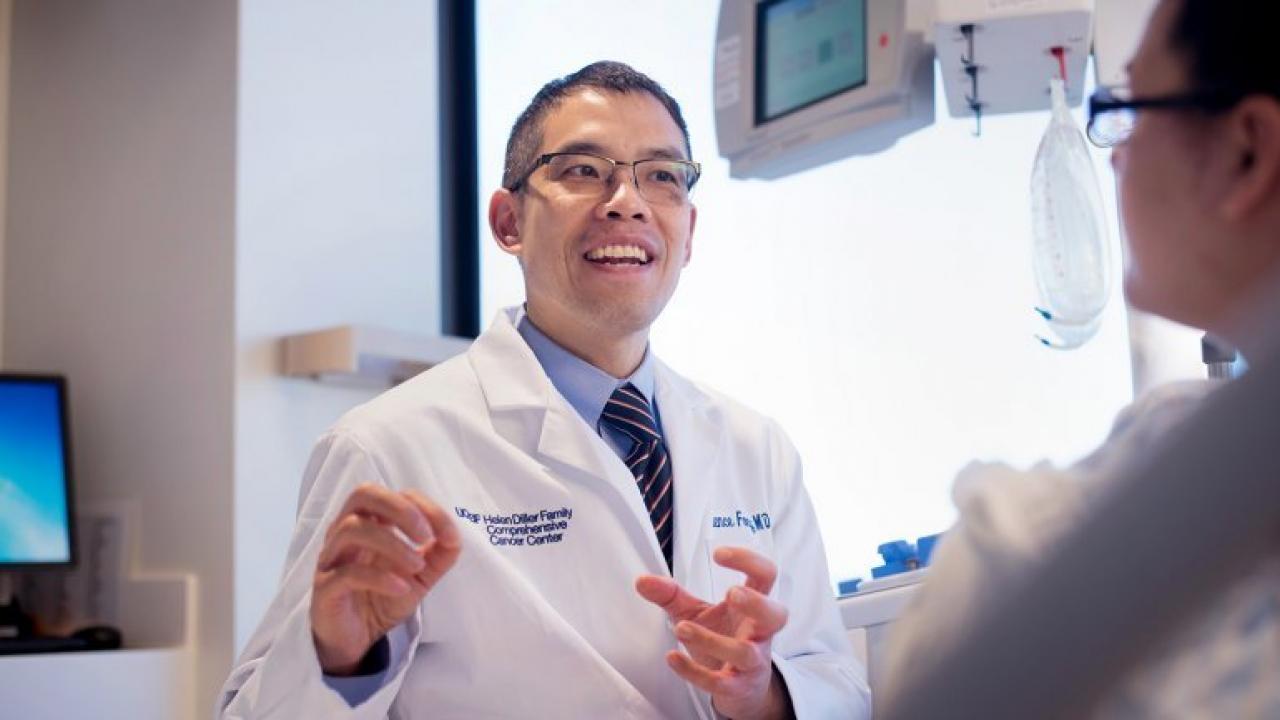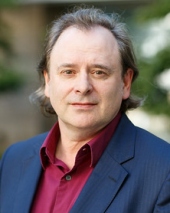
Oncologist Lawrence Fong, MD, is leading UCSF's newly launched Cancer Immunotherapy Program. Photo by Barbara Ries
UC San Francisco oncologist Lawrence Fong, MD, personifies the tremendous excitement among cancer physicians over the growing potential of new immunotherapies.
He smiles often as he explains how the body’s own immune system – long thought to be an ineffective slacker when it comes to combatting established tumors – now is being boosted or retrained by new drugs to more effectively engage tumor cells. In some cases, patients with advanced cancer who were expected to die quickly have been living with their cancer in check for years after immunotherapy treatment.
Today’s new immunotherapies are changing the paradigm for how we treat patients with cancer.
Fong, an early proponent of immunotherapy, now is leading UCSF’s newly launched Cancer Immunotherapy Program, which includes a clinical arm, the UCSF Cancer Immunotherapy Clinic. Located at the UCSF Medical Center at Parnassus Heights, the recently renovated, dedicated space is linked to the long-standing clinic for recipients of bone marrow transplants, which were used for decades to treat blood cancers.
“Today’s new immunotherapies are changing the paradigm for how we treat patients with cancer,” Fong says. “I believe they will prove valuable in treating many, if not most, types of cancer. In the context of clinical trials, we aim to provide access to novel immunotherapies that patients otherwise would not have access to.”
Fong established the program with funding from the UCSF Helen Diller Family Comprehensive Cancer Center. Now they are seeking companies, foundations and other potential partners to support the development and testing of innovative immunotherapy treatments.
Early Immunotherapy Work
Fong’s early work in immunotherapy involved enrolling patients with urologic cancers in early-stage clinical trials for what later became the first FDA-approved “checkpoint inhibitor,” a class of drugs that releases the brakes on the immune system, allowing immune cells to drive ahead to battle cancer.
That first FDA-approved checkpoint inhibitor, called ipilimumab (Yervoy), a valued treatment for many advanced cases of melanoma, was initially developed and tested in patients by UCSF-affiliated physicians and scientists. Checkpoint inhibitors now are approved to treat not only melanoma, but also certain types of lung and kidney cancer, and new generations of checkpoint inhibitors also are being evaluated in many cancer types.

Today, besides treating patients with urologic cancers, Fong is busy hiring staff, planning for first-in-human studies of novel drugs and enlisting additional UCSF specialists across the gamut of cancer types to identify opportunities for their own patients to receive immunotherapy in clinical trials.
“We need better cancer treatments that give people long-term remissions or even cures, and immunotherapy certainly merits the investment we are making,” says Alan Ashworth, PhD, FRS, president of the Diller Family Comprehensive Cancer Center. “For some, immunotherapies already are life-savers, and we are excited to explore ways to tailor immunotherapies for each patient – the essence of precision medicine for cancer.”
Serendipitous Phone Call Changes a Life
Robert Thistle, 70, who is battling metastatic kidney cancer, has lived in the same peaceful, rural home for more than four decades amid tall, 130-year-old redwood trees about 70 miles north of San Francisco. It was from this location that a happy coincidence led Thistle to Fong and a clinical trial that would change his life.